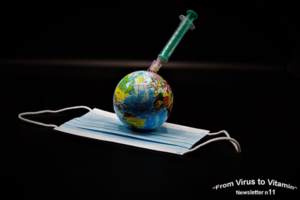OF Discussion Board n°11 – 11 December 2020
 Question asked : “Vaccines are in sight. How should the world cope with two related challenges which are both national and global. The first relates to intellectual ownership rights on patents and related royalties. The second to local distribution (free or not) and access priorities. Would it make sense to envisage setting up a world foundation, private-public partnership, linked or not to the WHO, to which could be entrusted all the rights to present and future COVID vaccines and which would allocate funding for research to private companies?”
Question asked : “Vaccines are in sight. How should the world cope with two related challenges which are both national and global. The first relates to intellectual ownership rights on patents and related royalties. The second to local distribution (free or not) and access priorities. Would it make sense to envisage setting up a world foundation, private-public partnership, linked or not to the WHO, to which could be entrusted all the rights to present and future COVID vaccines and which would allocate funding for research to private companies?”
Thanks for those of our contributors who ventured to react to the this question posed in this Discussion Board.
Editorial – Rush for Covid-19 vaccine: bottle-necks require public-private worldwide cooperation
by Virgile Perret & Paul H. Dembinski
The recent breakthroughs on COVID-19 vaccines has offered “a ray of hope” for the world, according to UN Secretary General Antonio Guterres, while fears are rising that “vaccine nationalism” – countries competing to inoculate their own populations first – may preclude fair distribution and thereby prolong the pandemic.
Vaccines have been developed at a breath-taking speed by competing private actors with – in some cases – financial support, and risk hedging provided by public agencies. Today all vaccines are “private goods” protected by intellectual property rights at national and international level. The access of populations to vaccines is constrained by a series of bottle-necks, some at producer side, others at logistics (cold chain) and inoculation ends of the operation, mainly in public hands. If the allocation is left to the private players alone, they will possibly prefer to serve first their most interesting clients and many governments of (mainly) rich countries that have made already upfront payments at initial stages of development.
Several experts have argued that in regard of the exceptional nature and impact of the pandemic, the vaccines must be considered as “a global public good”. The UN Secretary General publicly added that it should be “accessible to all.” The wide global access is today critical and bottlenecks have to be overcome without loss of time. First barrier is price: it seems that some vaccine providers have set the prices at affordable levels even for the poorest countries, others not. Second barrier is quantity and speed of delivery: here the question is how much restraint will show western populations and governments, some of which seem to have placed extravagant orders. Third barrier is local logistics, in poor countries.
The COVAX initiative – under the auspices of WHO – provides some light in the tunnel, however it is unclear, which vaccines it can access, when and at what price. Should COVAX not deliver to poor countries expectations, the temptation to limit or even break patent legislation in the name of public health priorities might come to the fore, as it was the case when in 1999 South Africa managed to obtain from global pharmaceutical companies deliveries of anti-AIDS therapies at production costs, only after having threatened of breaking – referring to WTO TRIPS provisions – the corresponding patents. Most probably patent holders of today will do their best to avoid a remake of such a situation knowing that their reputation, and possibly their very autonomy, in times of pandemic would be even more at risk than in 1999.
|
  |

| “… high but ultimately reasonable profit … ”
As far as the intellectual property question: I think it would be better to reward success according to cost and a high but ultimately reasonable profit and make the procedure available to all. As for the second: the idea of the foundation to ensure access seems a good one. Allocation of research does not seem to need a new channe.
Alfredo Pastor
|
|
| “… this opens the way to nationalizations …”
Here, two difficult ethical problems: first, the fair remuneration of research organizations and researchers; second, the universal destination of goods. Christian social teaching has here fairly clear answers in principle: the right price is not the market price, but the “common evaluation”, which is the evaluation by the community (of those who are directly concerned); the vaccine must go primarily not to the richest but to the most fragile members of the community.This opens the way to nationalizations – for which adequate modalities would have to be found – and therefore to a world Foundation of the type mentioned in the question.
Etienne Perrot
|
 |
| “… managing an epidemic is a collective good …”
The health sector challenges market economics. The market economy can work well in allocating privately appropriable goods & services where people are free to choose between more of this and less of that. Life itself is not one of those goods: without it there is no choice at all. People are therefore willing to spend extravagant amounts to preserve their own life. Pharmaceutical companies and kidnappers take full advantage of that. Collective goods also foul up the market economy. Once one person has one, it is automatically available to everyone else in reach, so everyone hopes someone else will pay for it. Managing an epidemic is a collective good. So is intellectual property, hence the contorted efforts to privatise it.
Edouard Dommen
|
 |
| “… continuous dialogue has to take place … ”
For human life to become normal again, covid vaccines or medicines are the only everlasting solutions. Friction already exists among various stakeholders. The question that arises is whether the exclusivity that is recognised by patent rights will be damaging to society. Will patents create obstruction or is there a solution? Continuous dialogue has to take place among innovators, manufacturers and supply chains; innovation be made public in order to enable further research for the common public good. An important move forward that the global community needs to recognize is the need for taking measures to protect public health and promote global access to new vaccines and medicines, requires a pandemic patent pool be created and managed centrally agency, patents which become part of the pool be readily made available for licensing.
Archana Sinha
|
 |
| “… the COVAX multilateral initiative is moving but needs more funds …”
Scenarios for vaccine production and logistics are changing by the hour. A worldwide cacophonic concert made of competition and cooperation, which includes pharma companies, national health services, transnational institutions (eg EU), WHO, NGOs and the media will however lead to solutions, and this is more credible and effective than any utopian centralised plan. Apparently, some countries (South Africa, India) have already requested WTO exceptions to property rules on vaccine patents. The COVAX multilateral initiative is moving but needs more funds… Let’s support the good initiatives already under way and speak for those in need of support. This is not a theory!
Domingo Sugranyes
|
 |
| “… a PPP to produce and distribute the vaccine worldwide …”
The vaccine is a public good. The intellectual ownership of the vaccines belongs to the firms that created them but given its public good nature, WHO should pay the developers for their work and turn it into a not for profit activity ensuring global production and distribution. The World Health Organisation should have a foundation in charge of paying vaccine developers with UN member Government monies. The foundation could then form a PPP to produce and distribute the vaccine worldwide. The resources from that should return to the foundation, distributing them worldwide for further research.
Oscar Ugarteche
|
 |
| “… a world private-public global initiative to manage COVID vaccines …”
Most of the governments worldwide are seemingly granting vaccines for free to their citizens, according to different access priorities, in some case yet to establish. If big pharma companies had considered the COVID-19 pandemic primarily as a chance to make huge and unexpected profit via patents and royalties, international institutions and governments, in particular, should make clear this cannot be the case. As concerns the possibility to set up a world private-public global initiative to manage COVID vaccines, research funding and related issues, this could be, at least in theory, an excellent initiative. However, in practice, I am rather skeptical: the foundation would be the immediate focus of the “attentions” of both governments and private sector’s actors, pharmaceutical companies in primis.
Valerio Alfonso Bruno
|
 |
| “… an obvious need for a reformed WHO …”
The COVID pandemic is not a reason for a radical revision of the norms of intellectual ownership rights on patents and related royalties or principles of private-public partnership. Democratic societies do not have such an urgent need, and non-democratic communities are unable to carry out such a revision. There is an obvious need not for a centralized “world foundation”, but for a reformed WHO, capable of effectively performing the functions of strategic forecasting and coordination. As for the issue of distribution (free or not) and access priorities, in developed democracies and rich undemocratic states, most likely such a problem will not exist as such. In poor undemocratic states, solving the problem will require external intervention and control.
Yuriy Temirov
|
 |
| “… agreements applicable at regional levels …”
On patents and royalties their worldwide protection is generally thought to have been significantly strengthened by the WTO TRIPS Agreement. Articles 7 and 8 of this agreement, intended to assure members of the WTO the right to implement public health measures, have not as yet sufficiently fulfilled these hopes, and the short-term effects of recourse to them would be all too likely to be slow. A world foundation would also take time to establish, even if agreement could be reached. The principal draft resolutions before the UN General Assembly are widely thought “not to provide sufficient guidance beyond broad exhortations of good faith principles”. A more promising approach might be to rely on agreements applicable at regional levels, for example, to make available proportions of produced vaccines to countries lacking required productive capacities.
Andrew Cornford
|
 |
 Question asked : “Vaccines are in sight. How should the world cope with two related challenges which are both national and global. The first relates to intellectual ownership rights on patents and related royalties. The second to local distribution (free or not) and access priorities. Would it make sense to envisage setting up a world foundation, private-public partnership, linked or not to the WHO, to which could be entrusted all the rights to present and future COVID vaccines and which would allocate funding for research to private companies?”
Question asked : “Vaccines are in sight. How should the world cope with two related challenges which are both national and global. The first relates to intellectual ownership rights on patents and related royalties. The second to local distribution (free or not) and access priorities. Would it make sense to envisage setting up a world foundation, private-public partnership, linked or not to the WHO, to which could be entrusted all the rights to present and future COVID vaccines and which would allocate funding for research to private companies?”










